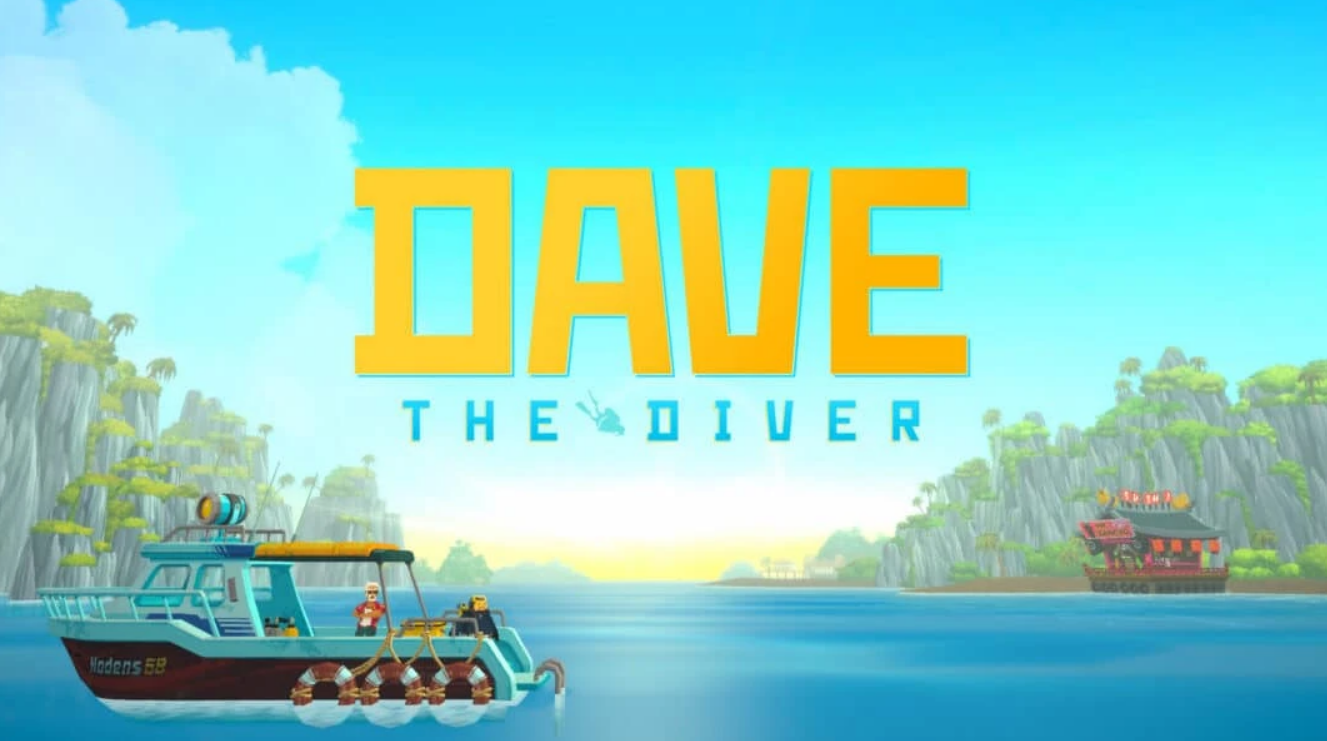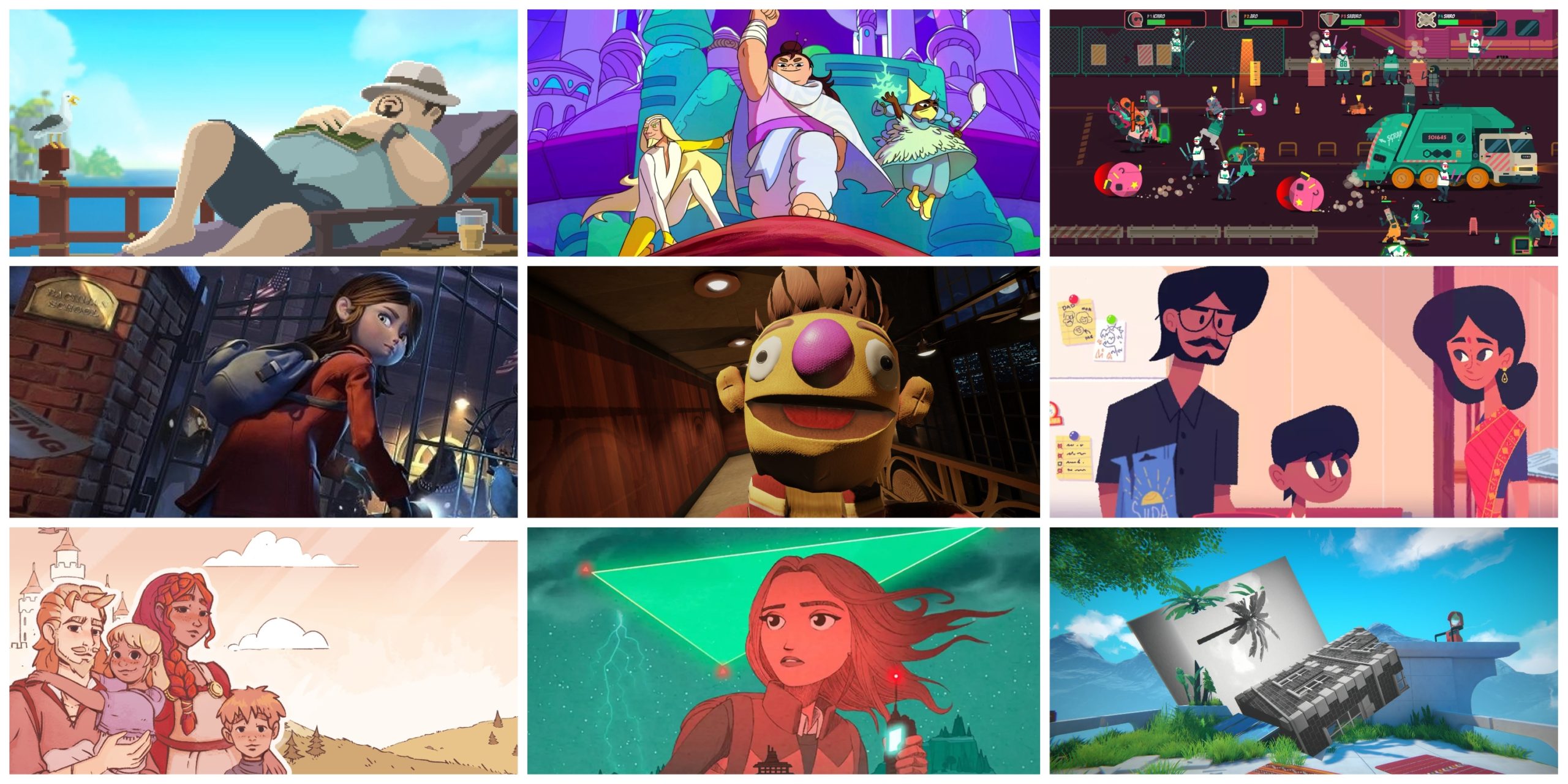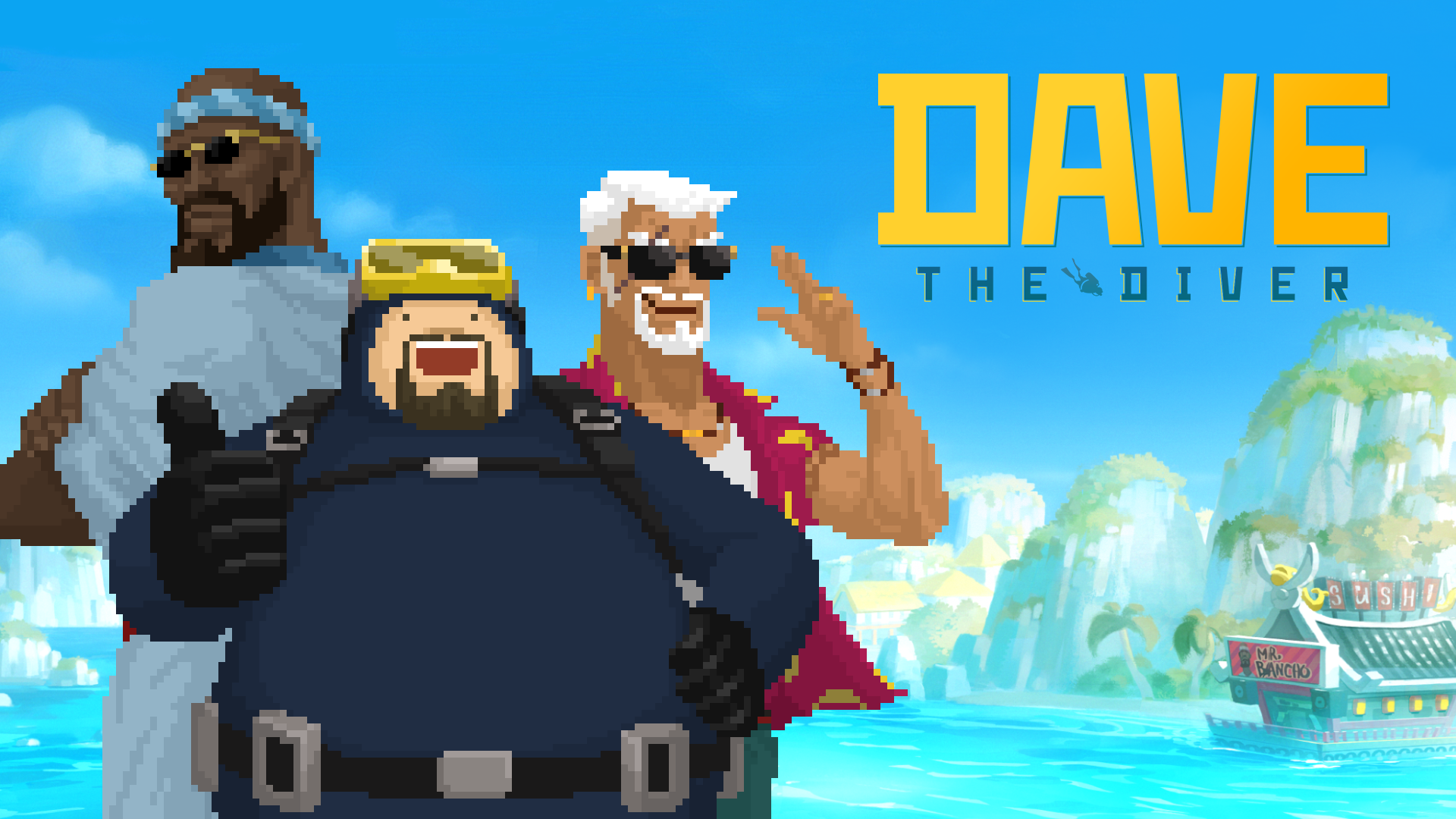Dave The Diver Review (PC) – Deep Fat Diver
There’s something that really works in combining the roguelite and the business sim. Dave the Diver combines a substantial 2D bed of roguelite diving sim that gives you a finite window of diving time each game-day, topped with a slice of running a sushi bar in the evenings, selling your catch and making bank. Sprinkle in some irreverent humour, social commentary, and crafting and present it in loving 2D pixelart, and it’s easy to see why this appetizing indie has become a sudden dark seahorse winner with gamers.
If you’ve been following the indie scene, you may remember Moonlighter back in 2018, where a young shopkeeper spent his nights venturing into roguelike portal dungeons, harvesting monster parts and items and then by day, arranging and selling them in his quickly expanding shop. It was a format that spoke to me and made it very easy to sink many hours of my time into running my business empire.
But separate the two and I lose interest. Business sims on their own lack action and adventure, and can be weighed down in stats. Dungeon crawlers and roguelites without something to work towards quickly become stale. Dave the Diver straddles that genre combination with a fine balance I don’t think we see enough of, and in doing so serves up a dish as addictive as sushi itself.
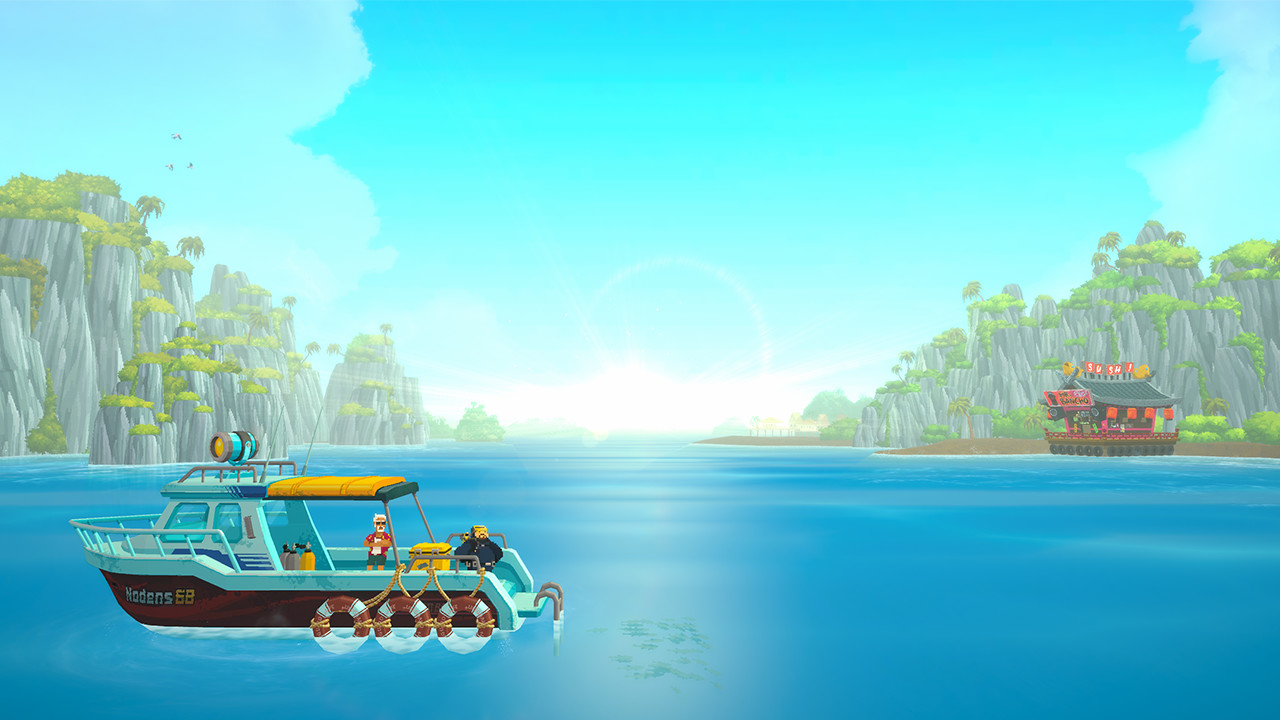
Fishing games have existed for decades, and never seem to go out of fashion. Indeed the minigame format has found its way into every RPG for the last two decades ever since Ocarina of Time just made it too much fun. But it’s not so often that the fishing game comes with a fun story, or that the minigame is enough to carry a whole game. Like Dredge recently did with eldritch horror, Dave the Diver does with humour, madness, and character.
Dave is a fat layabout just enjoying his holidays when he’s contacted by Cobra, a white-haired and very casual-seeming businessman with a big idea. He’s discovered the Giant Blue Hole, a very deep and very strange saltwater lake that changes every time you dive in. He’s set up a sushi bar on the shore and he needs a diver to catch fish and supply the bar. Just so happens Dave is a diver by trade. Just a fat ungainly one. Hey, don’t be like that. He’s graceful in the water.
At the sushi bar, Cobra has enlisted tall black maverick sushi chef Bancho to cook and prepare the dishes that the bar will serve. Bancho demands excellence, demands the most exotic fish and demands that Dave serve the customers if he wants to sample the amazing cuisine. The trio goes into business together, and so begins your sushi business diving adventure.
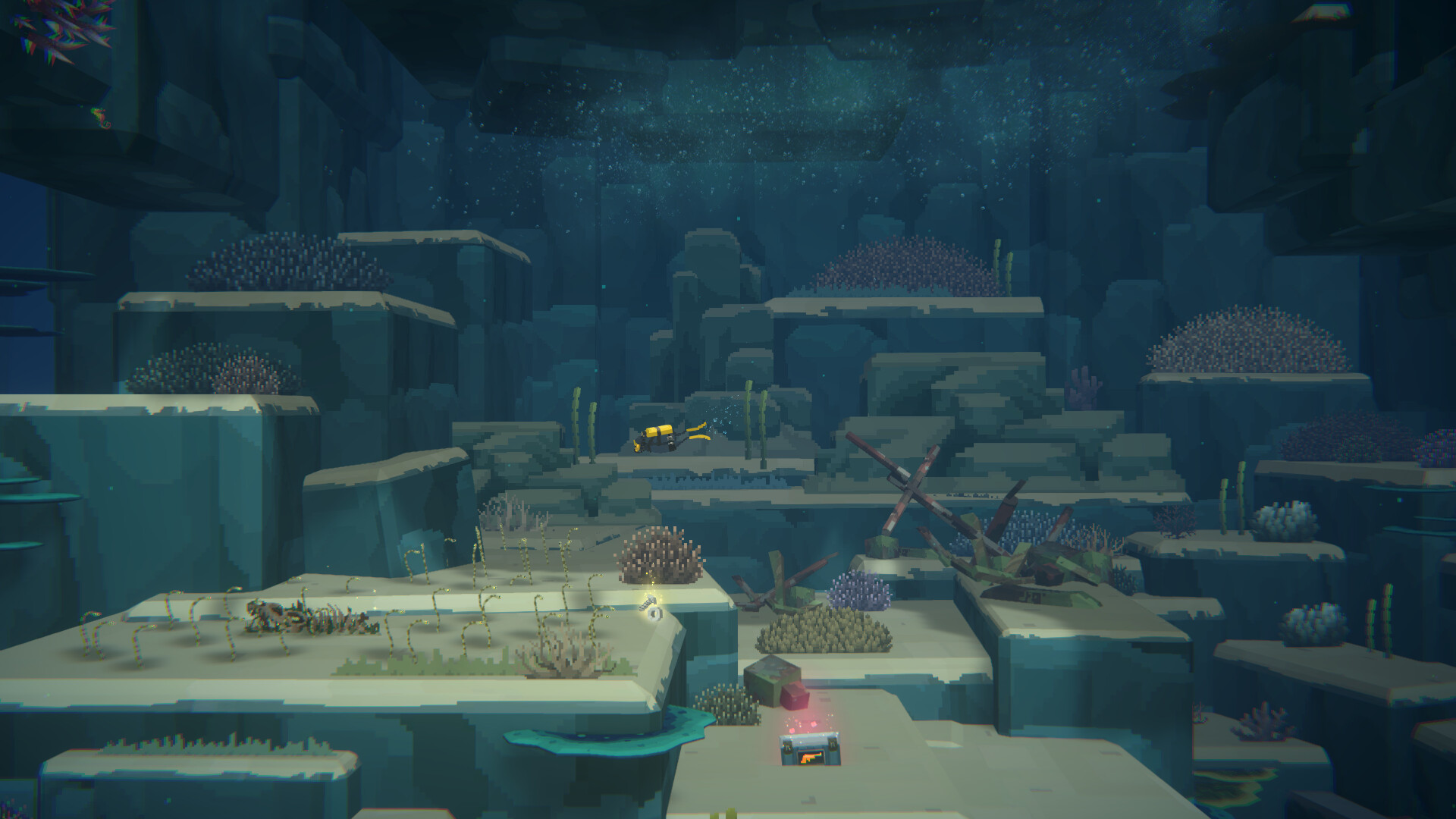
Over the course of days spent diving and nights spent serving sushi, Dave encounters a whole school of colourful side characters who demand either he dive for things for them, finds items, or prepares them specific plates of food. There’s the eco-warriors with government backing, the archaeologist investigating mer-people artifacts and then finding real mer-people with Dave’s help (which is the diving, sorry driving narrative), the eccentric sushi connoisseurs who demand you fight sharks in the deep, the anime-weeb who prints 3D weapons for you while worshipping his figurines. And the huge deep-sea squid that makes its home in the deepest depths of the Giant Blue Hole.
It’s all written with irreverent dialogue, sarcastic backtalk, and tongue-in-cheek commentary. There’s a fair few jibes at stereotypes and current events, but it’s all in good humour, and gives Dave the Diver its own unique flavour. I enjoyed the gameplay loop a lot, but the whole package is elevated and made compelling by the characters and the plot that slowly reveals the secrets of the lake and its mer-inhabitants.
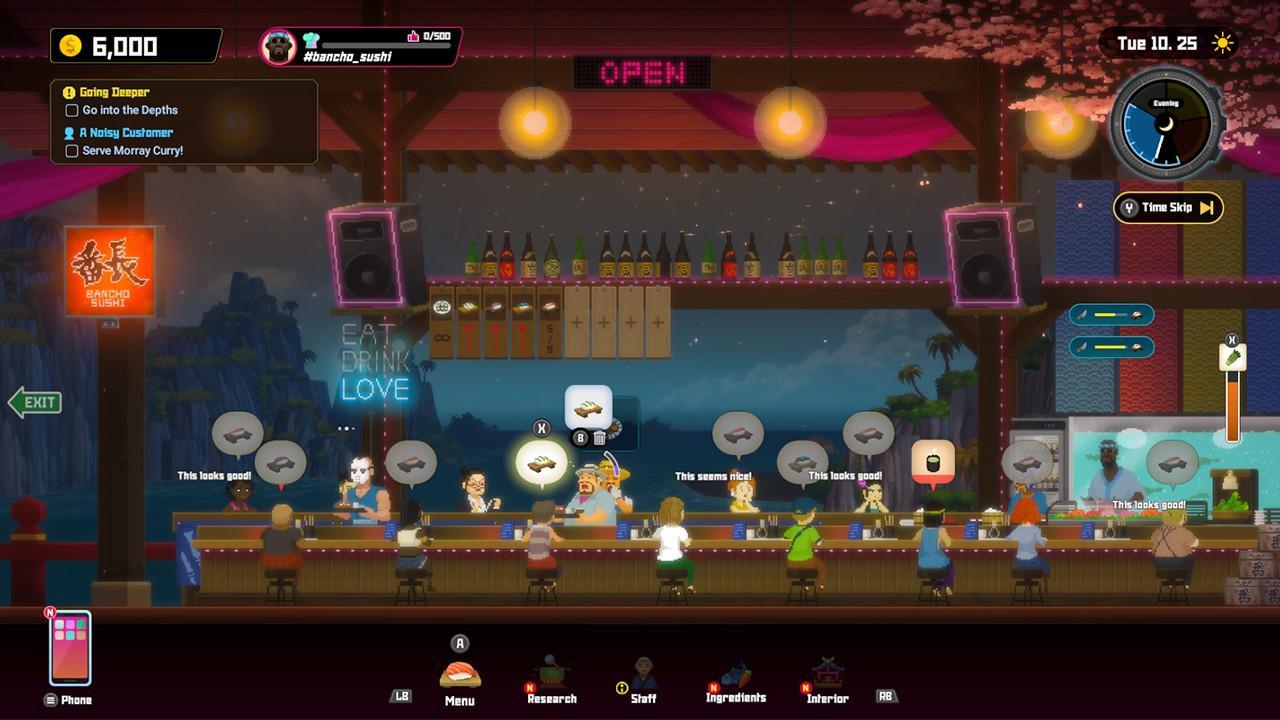
So how does the diving portion play, and how does the Sushi bar section play? Let’s take the diving section first as it is the deeper of the two. You rock up twice a day in your boat, once in the morning, once in the afternoon, and take a dunk over the side. The Giant Blue Hole is never the same twice as it’s a procedurally created underwater 2D expanse, far deeper than it is wide.
The roguelike element comes from these dives having a finite time to them, much like one would in reality. You have an oxygen tank and a finite amount of oxygen. Your health is tied to oxygen, so a few small jabs from the denizens of the deep will only result in you losing air. Only a much bigger jab or a proper attack will get you killed.
You are armed with an upgradable harpoon for spearing your catch, and most small fry can be taken this way. Stick your kills in your backpack and when you’ve filled the inventory weight limit you’ll move all sluggishly like an overloaded knight in Dark Souls that fell in the sea. It’s time to surface and send your catch over to Bancho at the sushi bar.
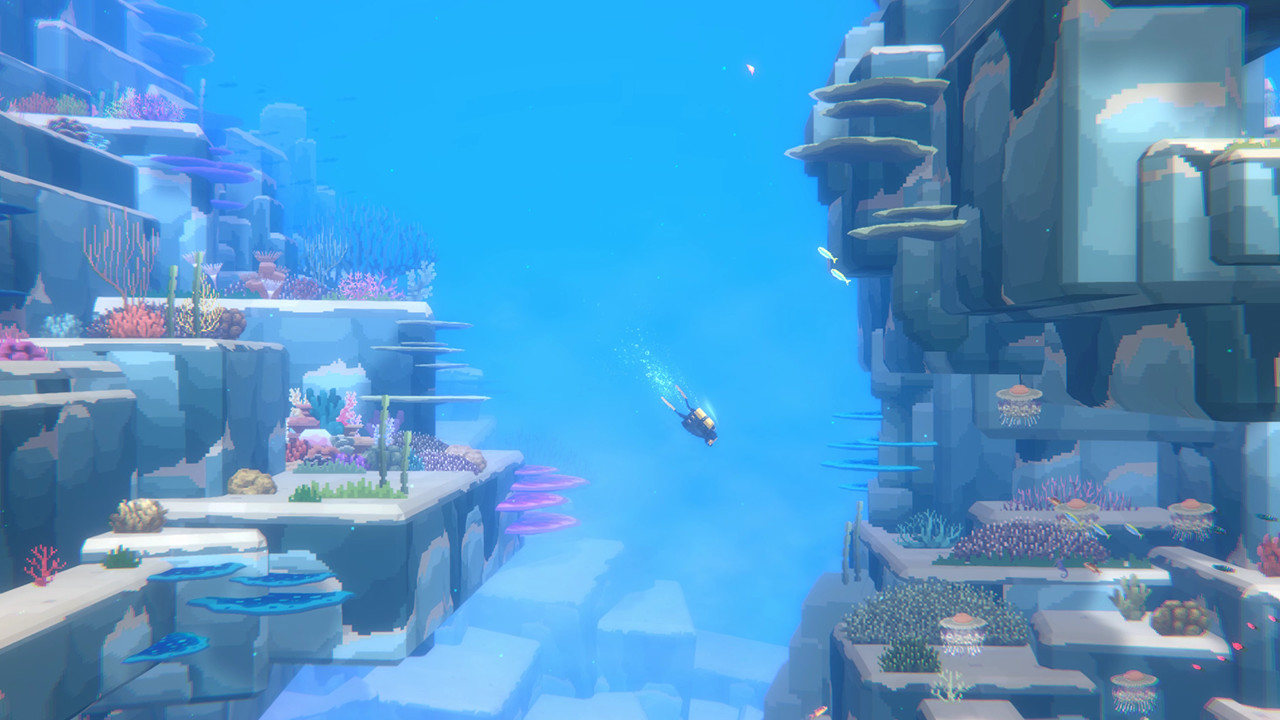
You get larger guns and weapons for the heftier beasts like sharks and poisonous fish. You aim with the stick, while holding the button down, and then release with a shoulder trigger. Many of the sharks will chase you while you try to do this tricky aiming backwards, and it can be hard to really do it well. But I never felt it was a great barrier to enjoyment. I think instead it’s a certain amount of deliberate constraint on the part of the devs to stop the game becoming a twin-stick arcadey shooter.
There’s also items down there – oxygen to prolong your run/dive, one-run weapons, upgrades, items to sell in Cobra’s shop. The incentives are all there in nicely balanced portions to make you take long runs, and then immediately just want to go back in again. Characters add missions all the time, getting you find their items or upgrade gear to help mer-people in the deep, or use bombs to open the way to a new area.
And as it’s different every time, it really never gets stagnant. Even finding the same spot, like a sunken boat twice may take you a few runs as it won’t be in the same place. Same with all items, fish, weapons and upgrades, and even the routes to the next area. I think Dave the Diver manages it all perfectly, and somehow makes me, a gamer who hates to do things over, or monotonous tasks, want to dive again and again.
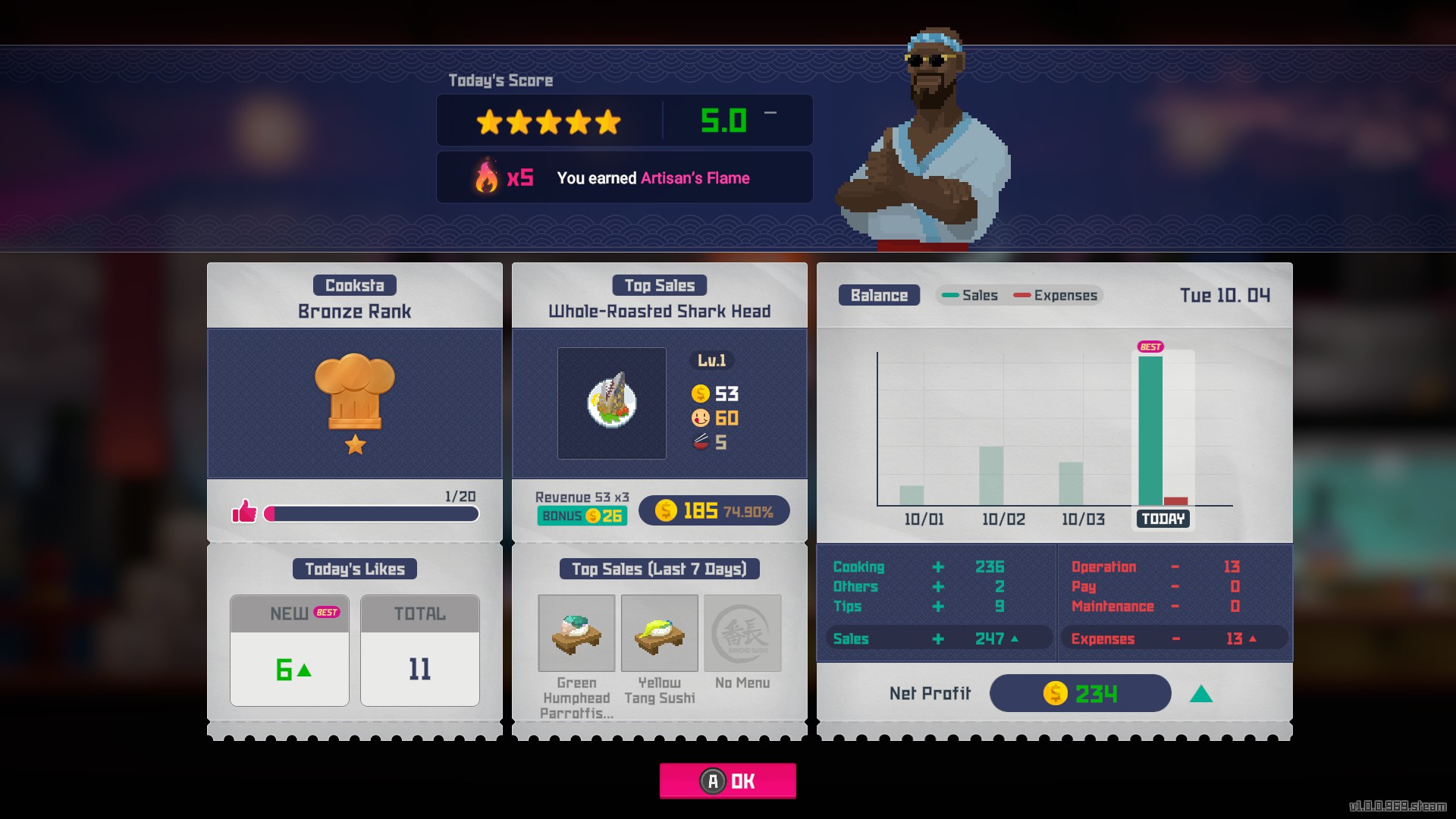
Yeah, yeah, that’s all good about the diving, but I want to run my sushi empire. Cool, let’s talk sushi. Haul in your catch and each day you need to make a bespoke menu out of everything you caught. Perhaps you’ve caught a lot of Lionfish, well then it’s Lionfish Nigiri today. You choose how much of your catch, and you upgrade the menu to be bigger and fuller as you go. The trick is not to overdo it, as anything not sold is thrown out at the end of the evening’s service. There was a small issue I had here – while choosing your menu, if you commit something to the menu, you can’t change your mind even while still on the same screen. Once it’s there, swapping it for something else wastes the catch. It’s a strict little quirk I did not appreciate.
When you’re ready it’s time to open the doors, and await the floods of customers. Bancho roars to life in the kitchen as orders come in automatically. It’s not up to you to make the rice or sushi, just to collect it and serve it – this is not Overcooked. Some customers want a nice green tea or beer before they start so you need to catch them early and pour it with a timing minigame. If they get their green tea, they’re likely to spend more on their food. Clear the plates, fling out the food, make sure the Wasabi doesn’t run out by scrapping more onto the board in another minigame. Generally keep the place running, but from the service and management perspective, until service ends.
Speaking of management, you’re in charge of more than the menu. You can hire staff, and get them to speed up kitchen production, or get them out in the bar serving tables and handling the dishes and teas. This frees you up to manage the menu when it starts to run out. You can train the staff, and they count as a small part of your expenses each night. You’ll get a receipt of earnings each night, and if you’re so inclined you can look into what fish sells best, or is most expensive, what dishes work best and then target that on your next run. Following the economics of your bar is easy but full of detail if you want it.
That hard-earned money has to go somewhere, and of course it basically completes this gameplay loop. Spend the money on your bar, sprucing it up sims-style, hire people, buy and upgrade your equipment so that you can dive further, deeper, faster, stronger. There’s better fish down there, pricier cuts, and rarer finds.
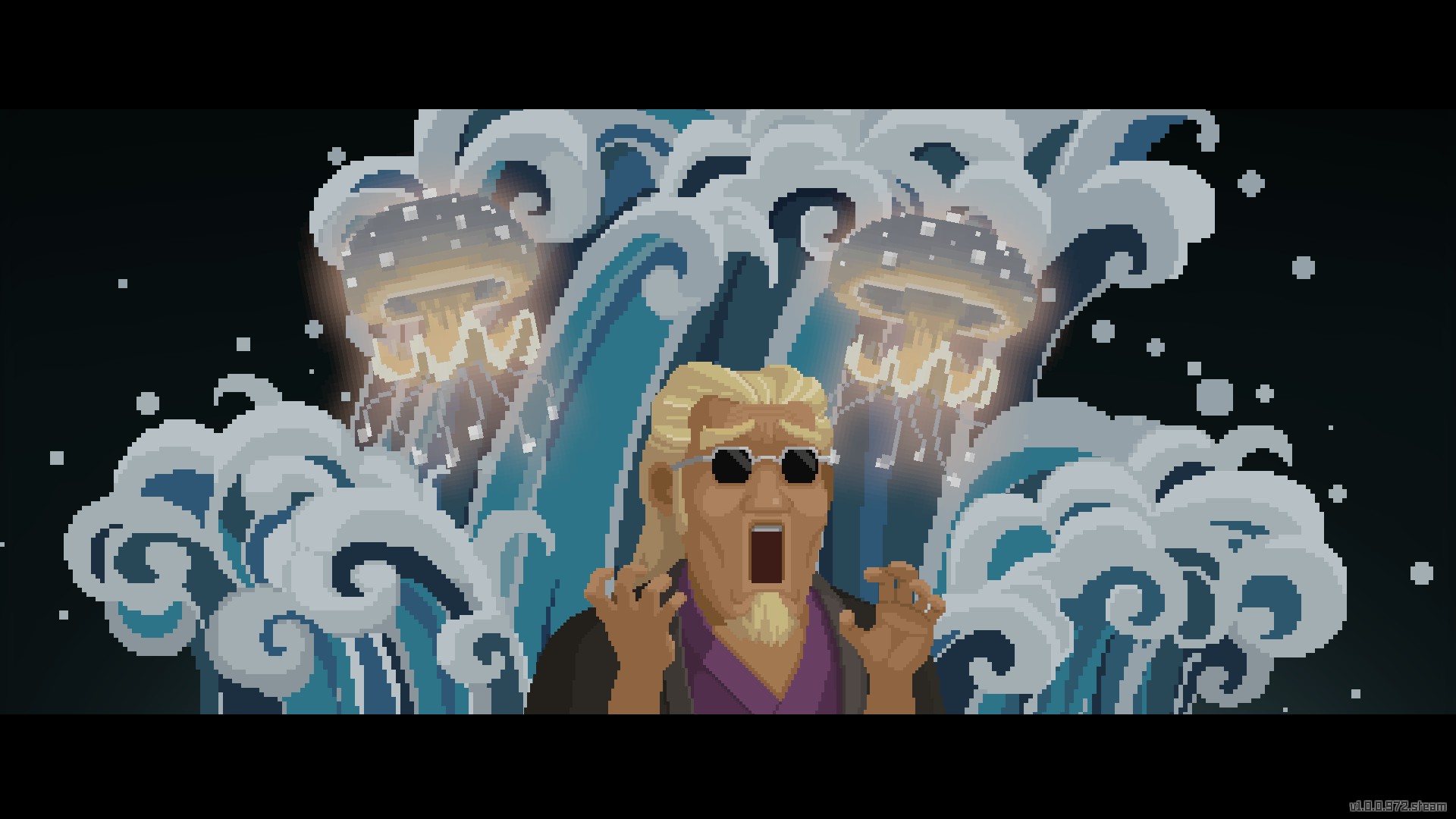
I said Dave the Diver has personality, and it’s in its quirks. Minigames at the drop of a hat – for example, cutting into a submerged ship, slicing fish, grinding wasabi, the service itself, pouring green tea. All of these give a game flavour. A game full of minigames is not the same as a game devoid. Its personality is also in the dialogue and these ridiculously over-the-top cutscenes when you order a new gun or research a new dish, showing Duff worshipping his figurines, Bancho creating a new dish, or customers having an orgasmic taste experience.
Though graphics are 2D pixel art and not the highest end of that scale, they are nice and have a bit of a Monkey Island, Lucasarts 90s flavour to them. Everything is as colourful as games get and it’s a welcome treat to the eyes. Comedy of this style often works best evoking that 90s point-and-click style and Dave the Diver revels in that.
Same with sound. It’s just got a lovely jovial set of relaxing tunes for your diving or serving. The audio doesn’t get old, and I found myself really starting to like the tracks and bop along every time they came up. There’s no voice acting in Dave the Diver, all the characters speak with a little Zelda-type sound effect, and you just read instead. It’s a shame, but indies with full voice-acting are pretty rare.
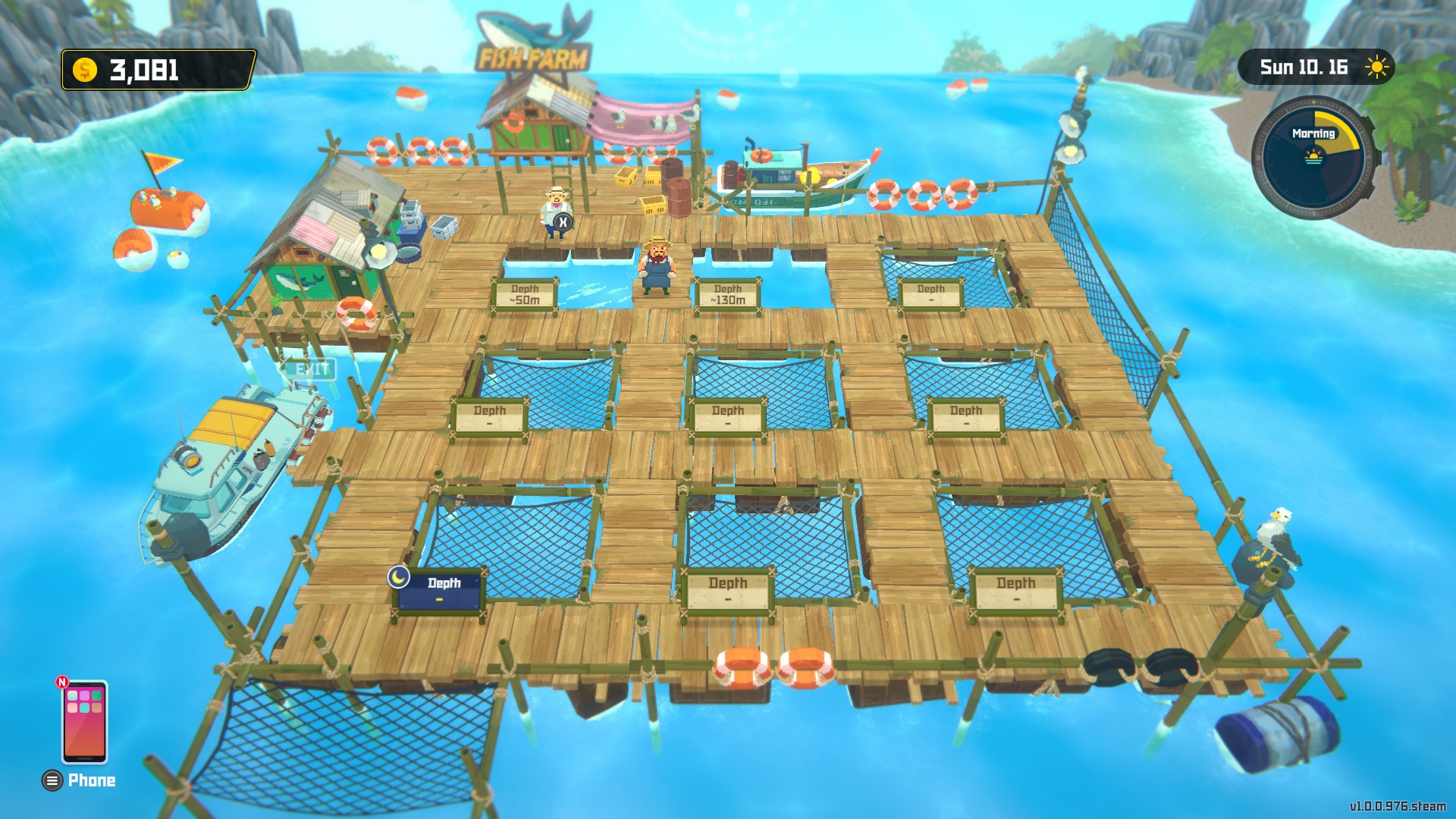
Dave the Diver manages the combination of diving roguelike and sushi bar management with the skill of a master sushi chef. The diving game is addictive, offering just that little bit more, little bit further drip feed of content every run. Same with the sushi bar, upgrading and running a better and better service with each of the new mechanics revealed. At the structural level it’s a masterclass in balance and doling out gameplay and dopamine hits in a perfect rhythm.
I just kept wanting to go back. I’d play another game for a short time, but I’d be thinking about my boat, and then want to get back in the water and explore some more. I’ve got items to find to supply my sushi empire. I’ve got rare fish to find. Service is up and I need to sell my sushi. The moment that’s over, well then I’m back in my boat. It’s an addictive loop. Far bigger releases in the last month have been far less capable in making a compelling loop.
As you get further, Dave the Diver gives you even more reasons to keep going. You open up a fish farm round the back of the bar where you can raise fish so you can concentrate on exploration. You gain the weapons and means to dive deep enough to discover the mer-people and the narrative blooms into further deeper territory once again. Even at the point of writing there were apps on my phone I hadn’t quite unlocked – there was still more to come.
With one of the most addictive gameplay loops of the year, Dave the Diver combines diving roguelike and sushi bar management with the skill of a master sushi chef. Its plucky irreverent tone, fun writing, constant minigames, and well-balanced drip-feed of mechanics made for an experience I was happy to sink many hours into.

Dave The Diver is available now for PC (review platform) via Steam.
Developer: MINTROCKET
Publisher: MINTROCKET
Disclaimer: In order to complete this review, we were provided with a promotional copy of the game. For our full review policy, please go here.
If you enjoyed this article or any more of our content, please consider our Patreon.
Make sure to follow Finger Guns on our social channels. Twitter, Facebook, Twitch, Spotify or Apple Podcasts – to keep up to date on our news, reviews and features.
